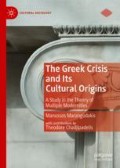Abstract
In this chapter, ‘culture’ is defined, its place in the social division of labor specified, and also distinguished from the pursuit of power and the instrumental use of value-statements. Based upon the principles and the problematique of Shmuel Eisenstadt’s theory of multiple modernities, and using Charles Taylor’s ‘constitutive goods’, Max Weber’s ‘substantive rationality’, Emile Durkheim’s ‘collective effervescence’, and Jeffrey Alexander’s and Phillip Smith’s ‘cultural pragmatics’ to specify particular aspects of the theory, an Analytic Model for cultural research is constructed and explicated. The heart of the model is ‘cultural pragmatics’, that is the performance of symbolic codes in public dramas, which are incorporated in the self as ‘internalized code orientations’ and permeates the social networks of social power as ‘institutional ground rules’ and ‘ethical orders’. The whole study explicates this mechanism.
Access this chapter
Tax calculation will be finalised at checkout
Purchases are for personal use only
Notes
- 1.
I base this definition of Windelband’s analysis of the Holy and its antinomian nature vis-à-vis pragmatic necessity (Windelband 2018, 305).
- 2.
‘An ‘ethical’ standard is one to which men attribute a certain type of value and which, by virtue of this belief, they treat as a valid norm governing their action’ (Weber 1978, 36).
- 3.
For a striking example of two complementary cases of theoretical and substantive rationality (and their patterned combination) see Part II, Sect. 10.3.2.
- 4.
Weber states this rather clearly when he argues ‘Thus, religious or magical behavior or thinking must not be set apart from the range of everyday purposive conduct, particularly since even the ends of the religious and magical actions are predominantly economic’ (Weber 1978, 400).
- 5.
World III refers to objective and tangible knowledge (scientific theories, technologies, tools, social institutions, etc.) created by humans, and which, contra World II, is (partially) autonomous from human interpretation (Popper 1978).
Bibliography
Alexander, Jeffrey C. 1988. Durkheimian Sociology. Cambridge: Cambridge University Press.
———. 2006. From the Depths of Despair: Performance, Counterperformance, and ‘September 11’. In Social Performance: Symbolic Action, Cultural Pragmatics, and Ritual, ed. Jeffrey C. Alexander, Bernhard Giesen, and Jason L. Mast, 91–114. Cambridge: Cambridge University Press.
Alexander, Jeffrey C., and Paul Colomy. 1985. Toward Neo-Functionalism. Sociological Theory 3 (2): 11–23.
Alexander, Jeffrey C., and Jasson L. Mast. 2006. Introduction: Symbolic Action in Theory and Practice: The Cultural Pragmatics of SYMBOLIC action. In Social Performance: Symbolic Action, Cultural Pragmatics, and Ritual, ed. Jeffrey C. Alexander, Bernhard Giesen, and Jason L. Mast, 1–28. Cambridge: Cambridge University Press.
Alexander, Jeffrey C., and Phillip Smith. 1993. The Discourse of American Civil Society: A New Proposal for Cultural Studies. Theory and Society 22: 151–207.
Alexander, Jeffrey C., Bernard Giesen, and Jason L. Mast, eds. 2006. Social Performance: Symbolic Action, Cultural Pragmatics, and Ritual. Cambridge: Cambridge University Press.
Bellah, Robert. 1967. Civil Religion in America. Daedalus 96: 1–21.
———. 2011. Religion in Human Evolution: From the Paleolithic to the Axial Age. Cambridge, MA: Belknap Press.
Calhoun, Craig. 1991. Morality, Identity, and Historical Explanation: Charles Taylor on the Sources of the Self. Sociological Theory 9 (2): 232–263.
Durkheim, Emile. 1995. The Elementary Forms of Religious Life. New York: The Free Press.
Durkheim, Emile, and Marcel Mauss. 1963. Primitive Classification. Translated and edited by Robert Needham. Chicago: University of Chicago Press.
Eisenstadt, Shmuel N. 1963. The Political System of Empires. Glencoe, IL: Free Press.
———. 1995. Power, Trust, and Meaning: Essays in Sociological Theory and Analysis. Chicago: The University of Chicago Press.
———. 2001. The Civilizational Dimension of Modernity. International Sociology 16 (3): 320–340.
Fairclough, Norman. 1995. Critical Discourse Analysis: The Critical Study of Language. New York: Longman Publishing.
Goffman, Ervin. 1959. The Presentation of the Self in Everyday Life. New York: Anchor Books.
———. 1967. Interaction Ritual. New York: Pantheon Books.
Harrison, Lawrence, and Samuel Huntington, eds. 2001. Culture Matters: How Values Shape Human Progress. London: Basic Books.
Howe, Samuel G. 1828. An Historical Sketch of the Greek Revolution. New York: Gallaher and White.
Kalberg, Stephen. 1980. Max Weber’s Types of Rationality: Cornerstones for the Analysis of Rationalization Processes in History. The American Journal of Sociology 85 (5): 1145–1179.
Mann, Michael. 1986. Sources of Social Power. Vol. I. Cambridge: Cambridge University Press.
———. 2006. The Sources of Social Power Revisited. In An Anatomy of Power: The Social Theory of Michael Mann, ed. John A. Hall and Ralph Schroeder. Cambridge: Cambridge University Press.
Marangudakis, Manussos. 2015. Multiple Modernities and the Theory of Indeterminacy. In Varieties of Multiple Modernities – New Research Design, ed. Gerhard Preyer and Michael Sussmann, 48–64. Leiden: Brill.
Popper, Carl. 1978. The Three Worlds. The Tanner Lecture on Human Values, Delivered at the University of Michigan. http://tannerlectures.utah.edu/_documents/a-to-z/p/popper80.pdf.
Swidler, Ann. 1986. Culture in Action: Symbols and Strategies. American Sociological Review 51 (2): 273–286.
Szakolczai, Arpad. 2009. Liminality and Experience: Structuring Transitory Situations and Transformative Events. International Political Anthropology 2 (1): 141–172.
Taylor, Charles. 1989. Sources of the Self. Cambridge, MA: Harvard University Press.
Weber, Max. 1978. Economy and Society. 2 vols. Edited by Guenther Roth and Claus Wittich. Berkley: University of California Press.
Whitehouse, H. 2004. Modes of Religiosity: A Cognitive Theory of Religious Transmission. London: Altamira Press.
Windelband, Wilhelm. 2018. Praludiean. Vol. 2. London: Forgotten Books.
Author information
Authors and Affiliations
Corresponding author
Rights and permissions
Copyright information
© 2019 The Author(s)
About this chapter
Cite this chapter
Marangudakis, M. (2019). An Analytic Model of Culture and Power. In: The Greek Crisis and Its Cultural Origins. Cultural Sociology. Palgrave Macmillan, Cham. https://doi.org/10.1007/978-3-030-13589-8_1
Download citation
DOI: https://doi.org/10.1007/978-3-030-13589-8_1
Published:
Publisher Name: Palgrave Macmillan, Cham
Print ISBN: 978-3-030-13588-1
Online ISBN: 978-3-030-13589-8
eBook Packages: Social SciencesSocial Sciences (R0)

